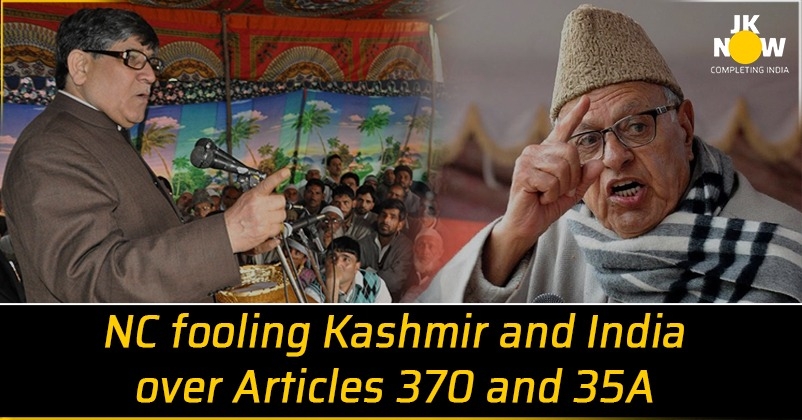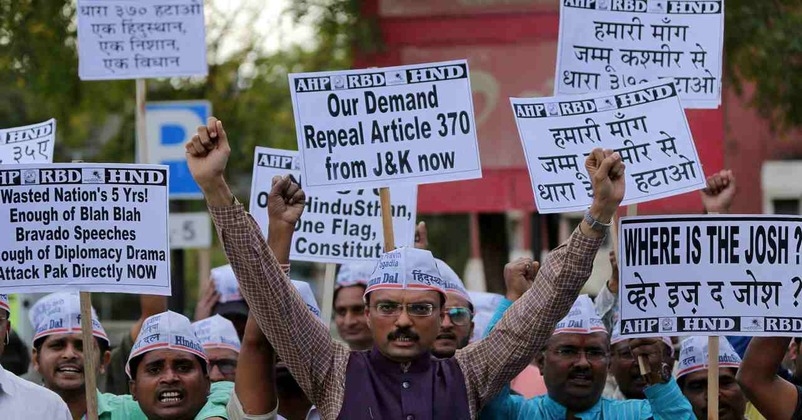Kashmir based political leaders lie when they say relationship between India and J&K come to an end, if Articles 370 and 35A are abrogated
| 28-May-2019 |

Lok Sabha elections are recently concluded in India, the largest democracy in the world, and the people of the country have once again put their faith in the leadership of Narender Modi. This time he won Lok Sabha election with more seats than the BJP won in 2014, on his own and the BJP has crossed the mark of 300, though only 272 seats are required to form the majority government. The saffron party easily won the three seats in the state of Jammu and Kashmir (J&K). Now, with this huge majority in Lok Sabha, the people of this country are looking upto this government with the hope that the party will deliver on its promises that it has made during the election process. In the context of J&K, BJP has made two major promises. The party manifesto reads, “We are committed to overcome all obstacles that come in the way of development and provide adequate financial resources to all the regions of the state. We reiterate our position since the time of the Jan Sangh to the abrogation of Article 370. We are committed to annulling Article 35A of the Constitution of India as the provision is discriminatory against non-permanent residents and women of Jammu and Kashmir. We believe that Article 35A is an obstacle in the development of the state”. Obviously, the reactions would come, from a few people from Kashmir valley, since the BJP has crossed the magic figure and the coronation of Narender Modi would take place in the next few days. The National Conference (NC), which had played a major role in the creation of the problems in Kashmir region, was the first among the Kashmir valley political outfit that has started misguiding people. Since the Lok Sabha elections are over and the J&K legislative assembly election will be announced soon, the party president made controversial statement. National Conference (NC) president Farooq Abdullah said on Friday that Prime Minister Narendra Modi cannot remove Article 35-A and Article 370 from Jammu and Kashmir. He told to the news reporters that "Let him be as powerful as he (Modi) likes, he cannot remove Article 370 and Article 35-A from the state of Jammu and Kashmir". Another NC leader Mohammad Akbar Lone, who won Baramulla seat in this Lok Sabha election made the wrong comparison between the accession of J&K and Articles 370 and 35A and said that the Kashmir will be separated from India if these two Constitutional provisions are abrogated. He even spoke the language of terrorist and said: “rivers of blood will flow here; peace won’t prevail anywhere”. Therefore, let us understand the relationship between India and J&K and these two provisions of the Constitution of India and how their abrogation is possible:
J&K acceded to India through IoA and became its integral part
J&K was one of the 560 princely states that acceded to India through Instrument of Accession (IoA), a standard legal document used by the princely states that acceded to India and became an integral part of it. The accession of the princely state was entirely the prerogative of the ruler and for this purpose, he has to sign the IoA and the same would be signified by the then Governor General Lord Mountbatten. This same IoA was signed by Maharaja Hari Singh on October 26, 1947, and signified by Lord Mountbatten on October 27, 1947. The Constitution of India came into force much later to the accession of J&K. It was on January 26, 1950, the Constitution of India was enforced and Article 370 was also part of it. Article 35A came in 1954 and not at all related to the accession of J&K. Hence, the state relationship with India was defined by the IoA and only the ruler of J&K can make any alteration in this relation, which is impossible because Maharaja Hari Singh is not alive. Also, the preamble and section 3 of the Constitution of J&K defines that the state of J&K is an integral part of India and these provisions cannot be altered. Hence, the relationship between India and J&K will not at all be affected by the abrogation of these to controversial Constitutional provisions.
Unconstitutional and discriminatory provision Article 35A
Article 35A is an unconstitutional and discriminatory provision. It is that part of the Constitution of India which was added by the President of India without getting it discussed and approved by the Parliament of India. Though many of the proponents of Article 35A state that the President of India has used the power conferred on him under Article 370 of the Constitution of India yet they overlooked the fact that it gives power to him to implement only those provisions, which have already been available in the Constitution. And Article 35A is the addition of a provision in the Constitution that requires amendment in the constitution and the amending power rests with the Parliament of India under Article 368 of the Constitution. Further, the constitutional amendment has not taken place for the purpose of adding this provision, as the addition of this provision is not available in the list of constitutional amendment list. The provision was added in Chapter III of the Constitution of India that deals with Fundamental Rights and through this provision, the violation of the fundamental rights was allowed. Ironically, the provision is also not found even between Article 35 and Article 36 or anywhere in the Constitution except appendix. This provision has allowed the violation of the fundamental rights of Women, Gorkhas, Dalits, West Pakistan Refugees (WPR) and the people living outside the state of J&K. Hence, on the parameters of violation of basic structure, spirit, and unconstitutionality, it would not be difficult even for the Supreme Court of India to abrogate this provision in the next few hearings, when the matter will be put up in front of the 5-judge bench of the Court.

Article 370- A temporary provision
Article 370 is the part of the Constitution of India when it was adopted by India in 1950. Under Part XXI of the Constitution of India, which deals with “Temporary, Transitional and Special provisions”, Article 370 is a temporary provision. Parliament of India has the power to amend the Constitution of India and that power is unlimited. The Apex Court of India established the same in Kesavananda Bharati v State of Kerala 1973 and mentioned that the Parliament of India has unlimited power to amend the Constitution of India, even the fundamental rights can be amended by the Parliament. In the same judgement, it was held that Parliament could amend any part of the Constitution so long as it did not alter or amend “the basic structure or essential features of the Constitution”. This judgment is applicable on all the amendments in the Constitution of India, including Article 370 because it is the provision of the Indian Constitution. Now, the concurrence of J&K legislative assembly is required only in case the President of India wants to abrogate this Article. But if the Parliament of India decides to remove any Article, including Article 370, from the Constitution, it only requires that a bill is moved in either house of parliament that has to be passed by a majority in each house and 2/3 members of each house are present and voting.
Hence, it is wrong to say that there is any relation between the accession of J&K and Article 370 and Article 35A. It is also wrong to state that the Modi Government cannot remove Article 370 and Article 35A. Rather BJP will be having full power to make such amendment and remove the controversial Article once it comes into majority in both the houses viz. Lok Sabha and Rajya Sabha. The citizens of India have given the mandate to BJP for this purpose and it is highly likely that both the controversial, oppressive and discriminatory provisions will be removed by Modi Government. It is essential that Dr. Farooq Abdullah and other leaders of his party must stop fooling the people of J&K and let the two oppressive and discriminatory provisions be removed from the Constitution, as the same is demanded by the people of J&K on many occasions.
Tags:
